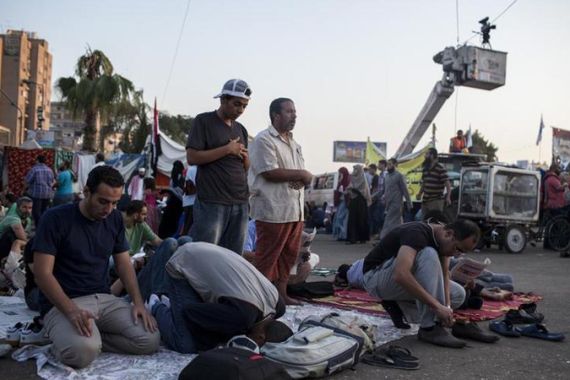Can Cairo’s vigils be dispersed peacefully?
Despite the potential for bloodshed, Egypt’s government vows to clear the pro-Morsi sit-ins.

Cairo, Egypt – The clock is ticking on the two sit-ins in Cairo – a small protest outside Cairo University and a massive gathering based around Nasr City’s Rabaa al-Adawiya mosque, where tens of thousands of supporters of deposed president Mohamed Morsi say they will continue their vigil until he is reinstated.
The Egyptian cabinet ordered the evacuation of the sit-ins by “all necessary measures” on August 1; Prime Minister Hazem el-Beblawi said last week that anyone who did not leave the sit-ins was putting themselves at risk, and a 48-hour ultimatum issued by the Ministry of Interior to voluntarily evacuate the sit-ins passed on Monday.
Rights groups such as Amnesty International have already issued statements against a forced evacuation, saying that doing so would be a “recipe for further bloodshed”.
|
|
| Military supporters call for eviction of sit-in camps |
The tense situation with the protests and the promise of their imminent clearing dominates the news in Egypt, with almost daily reports on what the government and security forces have planned for the vigils. These reports – often attributed to “unnamed sources” – further serve to put people on edge.
Gamal Eid, head of the Cairo Arab Network for Human Rights Information, said that that reports of the interior ministry’s plans are likely not real, and that “most of what’s published is a form of psychological warfare”.
Cairo police are not known for peacefully clearing sit-ins – their attempts often yielding violent, deadly results. One of the more infamous was the Mohamed Mahmoud sit-in, which police tried to clear in November 2011.
Their attack on the protesters led to several days of violent clashes in the neighbourhood.
‘Reasonable losses’
Mohamed Qadri Saeed, head of the security studies unit at Al-Ahram Centre for Strategic Studies, said that “police are getting ready for a confrontation” but that “some political parties are pushing for more patience and that any confrontation should be postponed in order to give people time to leave or, perhaps, for a political solution”.
Saeed, a former military general, said he felt police were “capable of dispersing people with good results”, and the army, he said, was likely offering all forms of indirect strategic support.
“But the army wouldn’t intervene in a direct way, because this would complicate the situation,” he added.
In case there are casualties, it will be contained
There will be “certain action” this week by police to end the sit-ins, he said, as allowing them to continue would worsen the country’s political crisis.
Saeed told Al Jazeera that “there will most probably be deaths and injuries, but I think that these [will be] reasonable losses that people will accept to overcome the political crises”.
Egyptian media has reported that a violent crackdown on the sit-ins might result in the death of as many as ten percent of protesters. This number, said Saeed, was “reasonable”, and that the deaths would not have an impact on Egypt’s stability.
“But these percentages are all speculation,” said Saeed.
Abdul-Monem al-Mashat, national security expert and dean of the faculty of economic and political science Future University in Egypt, agreed that the losses would be “minimal”.
“They will do their best to do it in a peaceful way or, at least, with less casualties,” said al-Mashat.
“In case there are casualties, it will be contained as the laymen start to have a very negative attitude toward the MB [Muslim Brotherhood],” said al-Mashat.
“They are losing any popular support. Even the demonstrators will go away once their source of money is depleted.”
Attack might happen ‘at any time’
Security at the Raaba sit-in has been on heightened alert since Sunday night, when a power cutleft most of the vigil in total darkness, testing the organisers’ ability to hook up power generators and maintain basic services.
They might attack at any time, but it's almost impossible to disperse the sit-in... we are defending this sit-in with our souls.
“The situation is open to all possibilities,” said Ahmed Abu Ouf, one of the hard-hatted, baton-wielding men guarding the sit-in.
“They might attack at any time, but it’s almost impossible to disperse the sit-in,” said the 43-year-old, an accountant by trade.
“They would actually have to throw thousands of people out… and we are defending this sit-in with our souls.”
Still, there seems to be a cognitive dissonance at work in Rabaa, where the threat of police action is seen as a possibility, but viewed as an improbability.
“I think all of what’s been said for the past few days are rumours – we can’t think that they’re being serious,” said 30-year-old Mohamed Ahmed, standing guard at the western El-Nasr Street exit.
“They can’t attack the sit-in because there would be a lot of bloodshed, a lot of martyrs. Even if they killed tens or hundreds, here are still thousands of people who don’t want to leave this place,” said Ahmed, who owns a dry cleaning business.
“I think the cause is worth it. The country is being destroyed – it’s heading to a dark future.” Ahmed said the legitimacy not only of Morsi’s presidency, but of the democratic process itself was at stake.
“Even if they have new elections, what is the guarantee that the military won’t do the same thing again?”
Follow @dparvaz on Twitter.